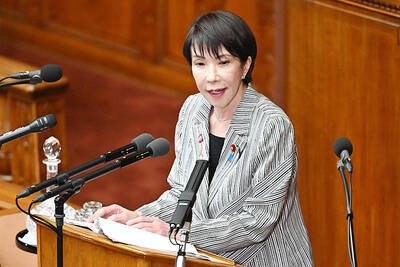World leaders expressed confidence in the global economic recovery on Friday despite fears about a debt default by Gulf emirate Dubai, while major banks played down their exposure to the debt.
Stocks from Tokyo to New York were haunted by concern that banks were exposed to state companies in Dubai, whose rise from a desert backwater into the business hub of the world’s top oil exporting area lured expatriate cash and executives.
“While it is a setback, I think we will find it is not on the scale of previous problems we have dealt with,” British Prime Minister Gordon Brown told reporters in Port of Spain. “The world financial system is stronger now and able to deal with the problems that arise.”
French Prime Minister Francois Fillon said the Gulf had the resources to ensure the world would not sink into a second round of turmoil, but Russian Prime Minister Vladimir Putin said the saga showed how hard it is to shake off a crisis that has lasted two years.
In the US, administration officials said the Treasury Department was closely monitoring the situation in Dubai, while Canadian Finance Minister Jim Flaherty said the G7 industrialized nations has had discussions about Dubai’s credit issues and was monitoring consequences.
Japanese Finance Minister Hirohisa Fujii raised the prospect of a G7 joint statement on currencies in Tokyo after the Dubai debt worries pushed the Japanese yen to a new 14-year high against the dollar. But no such statement has been issued and the yen retreated from its earlier highs.
The crisis began on Wednesday when Dubai, part of the United Arab Emirates (UAE) federation, asked to delay payment on billions of dollars of debt issued by conglomerate Dubai World and its main property subsidiary Nakheel, developer of three palm shaped islands that once attracted celebrities and the super-rich.
Dubai World had US$59 billion in liabilities as of August, most of Dubai’s total debt of US$80 billion. International banks’ exposure related to Dubai World could reach US$12 billion in syndicated and bilateral loans, banking sources told Thomson Reuters LPC.
However, the numbers pale in comparison to the US$2.8 trillion in writedowns the IMF estimates US and European lenders will have made between 2007 and next year.
“The events in Dubai in recent days are one of the hiccups if you like, one of the difficulties, which affirms that we were right to highlight the uncertainty ahead of us and that the road ahead could be a bumpy one,” European Central Bank Governing Council member Athanasios Orphanides said.
Analysts expect Dubai to receive financial support from Abu Dhabi — a fellow member of the UAE and home to most of its oil — though it may have to abandon an economic model focused on developing swathes of desert with foreign money and labor.
However, the prospect of a bailout did little to allay concerns among investors, already worried the global economy may not be recovering quickly enough to justify a near doubling of prices for emerging market stocks and many commodities since March.

‘SECRETS’: While saying China would not attack during his presidency, Donald Trump declined to say how Washington would respond if Beijing were to take military action US President Donald Trump said that China would not take military action against Taiwan while he is president, as the Chinese leaders “know the consequences.” Trump made the statement during an interview on CBS’ 60 Minutes program that aired on Sunday, a few days after his meeting with Chinese President Xi Jinping (習近平) in South Korea. “He [Xi] has openly said, and his people have openly said at meetings, ‘we would never do anything while President Trump is president,’ because they know the consequences,” Trump said in the interview. However, he repeatedly declined to say exactly how Washington would respond in

Japanese Prime Minister Sanae Takaichi said yesterday that China using armed force against Taiwan could constitute a "survival-threatening situation" for Japan, allowing the country to mobilize the Japanese armed forces under its security laws. Takaichi made the remarks during a parliamentary session yesterday while responding to a question about whether a "Taiwan contingency" involving a Chinese naval blockade would qualify as a "survival-threatening situation" for Japan, according to a report by Japan’s Asahi Shimbun. "If warships are used and other armed actions are involved, I believe this could constitute a survival- threatening

WARFARE: All sectors of society should recognize, unite, and collectively resist and condemn Beijing’s cross-border suppression, MAC Minister Chiu Chui-cheng said The number of Taiwanese detained because of legal affairs by Chinese authorities has tripled this year, as Beijing intensified its intimidation and division of Taiwanese by combining lawfare and cognitive warfare, the Mainland Affairs Council (MAC) said yesterday. MAC Minister Chiu Chui-cheng (邱垂正) made the statement in response to questions by Democratic Progressive Party (DPP) Legislator Puma Shen (沈柏洋) about the government’s response to counter Chinese public opinion warfare, lawfare and psychological warfare. Shen said he is also being investigated by China for promoting “Taiwanese independence.” He was referring to a report published on Tuesday last week by China’s state-run Xinhua news agency,

‘ADDITIONAL CONDITION’: Taiwan will work with like-minded countries to protect its right to participate in next year’s meeting, the foreign ministry said The US will “continue to press China for security arrangements and protocols that safeguard all participants when attending APEC meetings in China,” a US Department of State spokesperson said yesterday, after Beijing suggested that members must adhere to its “one China principle” to participate. “The United States insists on the full and equal participation of all APEC member economies — including Taiwan — consistent with APEC’s guidelines, rules and established practice, as affirmed by China in its offer to host in 2026,” the unnamed spokesperson said in response to media queries about China putting a “one China” principle condition on Taiwan’s